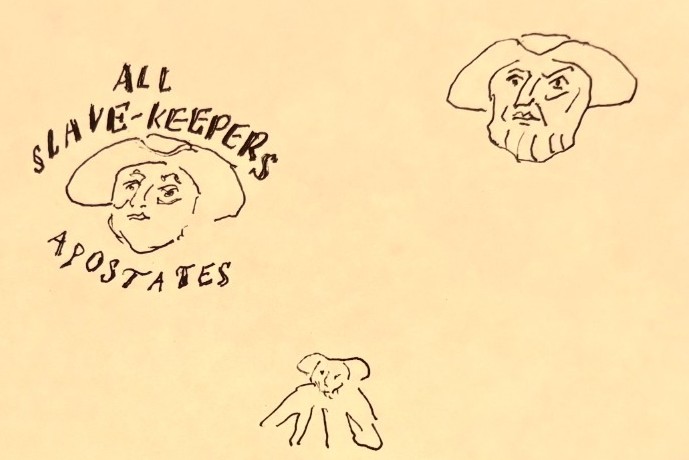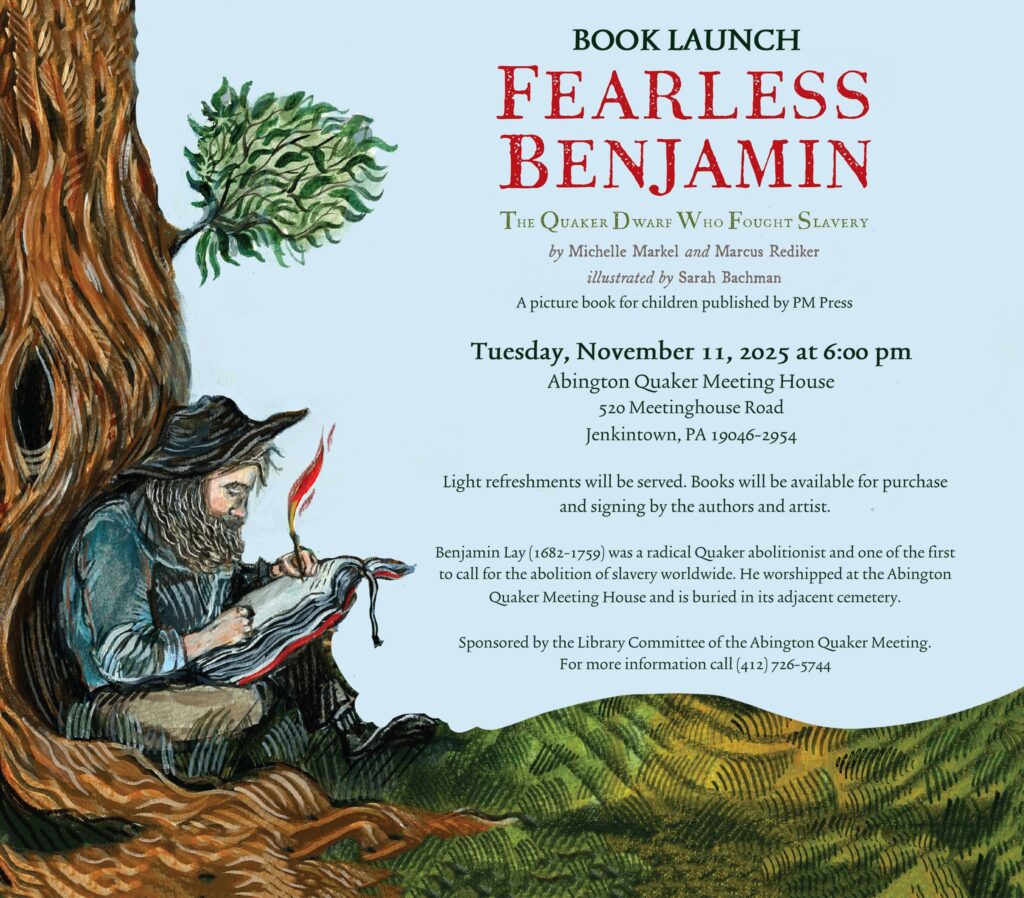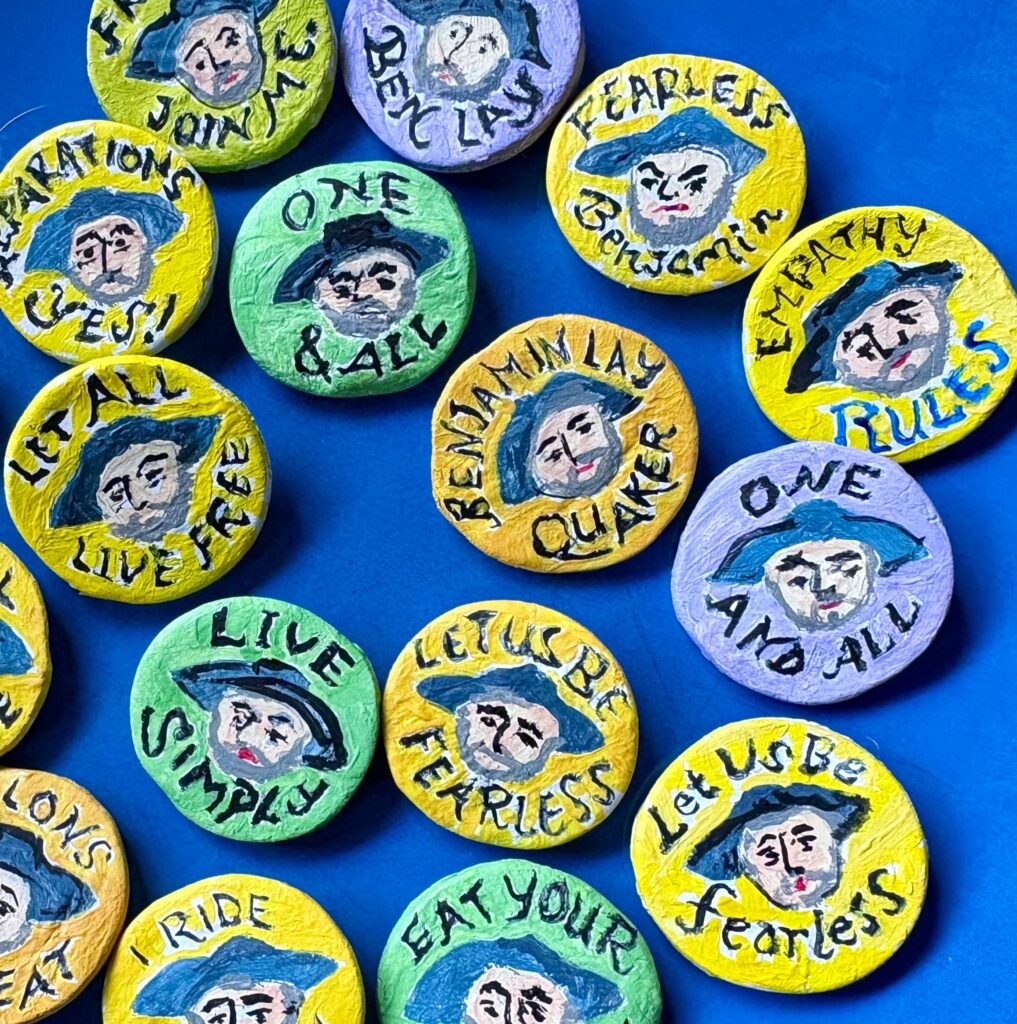LET’S MEET AT THE BOOK LAUNCH at Abington Meetinghouse at 6pm on Tuesday, November 11, 2025! Write to Radnor Meeting (type radnor.meeting @ radnorquakers . net without the spaces) if you need to know more, or just want to let us know you’re coming. Maybe you can give someone a lift. Families are welcome.
Fearless Benjamin: The Quaker Dwarf Who Fought Slavery is about to set sail to the Abington Quaker Meetinghouse (Jenkintown, Pennsylvania). It’s the new children’s book by Michelle Markel and Marcus Rediker, illustrated by Sarah Bachman. This has me thinking about the history lessons, books, games and songs I encountered in elementary school, and perhaps you did, too.
Please scroll to read on…
When I was a youngster, no one gave me a history book about how wealth, influence, and status were created on this land. I was not told that the ancestors of many of my “fellow Americans” were considered the property of others.
Elementary school teachers tiptoed around the topic. History spoke of founding fathers, not slavers. We cheered for Harriet Tubman, fascinated with the phrase Underground Railroad. It hinted at courageous struggles of enslaved people that could not even be told in whispers. There were no teachers of African heritage in my school. No one asked why.
Today, at least some kids can take field trips to the National Museum of African American History and Culture. It’s still there, right? You see. A rich, geographically accessible body of teaching is needed now, as it was when we were elementary school kids. Fearless Benjamin could not be timelier.
Full of Goodness
Co-author Marcus Rediker has been uncovering information about Benjamin Lay’s life for years, and producing collaborative works of art and education from the findings: a biography, a graphic novel, a stunning, one-person play featuring Mark Povinelli, past president of the Little People of America.
Benjamin Lay’s own denunciation of slavers appeared when Benjamin Franklin published it in 1738 under the title All Slave-Keepers That Keep the Innocent in Bondage, Apostates. Now, with this children’s book, Marcus Rediker joins Michelle Markel to contemplate anew the fierce integrity of the 18th-century sailor-turned abolitionist in a way little children can absorb.
As a child, Benjamin faces teasing for being a different size than the other children…
“…but he knows he’s full of goodness.”
It’s a striking message. Benjamin hears the teasing, yet doesn’t dwell in it. It is integrity—being full of goodness—that actually matters.
From this foundation, a young reader will then consider the reality of human bondage, and what happens because “Little Benjamin” spent years urging fellow Quakers to call it wrong. The result will be remarkable.
A Sailor and a Co-Worker in the World
The collaboration through which Markel, Rediker and Bachman (they’ll all be at the book launch) produced Fearless Benjamin echoes the collaborative nature of Benjamin Lay’s work in the world. Solidarity on the ship was essential to surviving the journeys at sea. The sailor’s motto is One and All! Perpetrators and victims of human trafficking could have been co-workers. Benjamin knew it. This horrible system had to be stopped.
Benjamin meets Sarah Smith, another person of short stature and a Quaker minister. Their plan is to go to Philadelphia and call for the immediate release of enslaved people. But when they get there, they hit a wall. Many prominent Quakers own slaves. This selective disregard for the Quaker commitment to peace is utterly intolerable to Benjamin, who becomes a personification of rebellion in the streets and in the meetinghouses. Time after time, Benjamin goes out to stage dramatic protests against slavery, confronting the leaders who uphold and benefit from the system.
What happens then?
Much like those who resist oppression in our present world, Benjamin winds up under surveillance. Benjamin is repeatedly ejected from Quaker meetings—even physically thrown out. And then, as the story tells us, “Benjamin and Sarah find a new home, this time in a cave, miles away.”
In a cave? Oh, yes, this is truly the stuff of a riveting story! But it’s true. Not only do Benjamin and Sarah really live in a cave, but they turn it into a library with hundreds of books. And they plant gardens and trees and flax so they can grow food and make clothes as simply as possible, without the exploitation of any fellow creature – human or other. For we are all co-workers within the great, living community on Earth.
Benjamin grows old. One day a friend brings news: Change, finally, is coming. All Quakers must personally divest from the system of human bondage. The significance of this decision is monumental. Quakers emerge as the first religious group to ban enslavement. Collectively, they become co-workers in the global emancipation movement.
If Only We’d All Received This Book as Children!
After I grew up, I began to understand the real history of the nation as it was formed. I began to learn my responsibilities on account of that history. I wish I’d learned earlier.
I wish I’d been taught that the impulse which leads us to sustain human-rights work is due for an extension to other living, feeling communities as well.
Now that I’m a grownup, I welcome such an expansion of our moral and spiritual circle, our beloved community.
Repairing the harms that linger from the days of enslavement, and seeking our right relationship with fellow living, feeling beings—these are things I yearn to find in spiritual places. Benjamin and Sarah tell me those things are here, right here within us, ever-ready to spring into our consciousness and lead us in continuing revelation.
Fearless Benjamin could be that early catalyst, preparing young explorers to reach their full potential. Within that journey comes the strength to face the wrongs that still plague our society. To replace them with right actions and right relationships, regardless of how we might be teased or thrown. To work, co-work, to repair the damage done. To focus each day on embodying the spirit of collaboration… 
Well, it’s never too late to have a truth-filled childhood. To delight in Sarah Bachman’s beautiful illustrations, that remind me of Quaker folk art. To find myself “eldered” by the gentlest of Quaker ancestors, channelled with care by Michelle Markel and Marcus Rediker.
Reading Fearless Benjamin and anticipating the book launch have moved me to get some clay so I can make clay pins with Benjamin on them, for friends who’ll be coming to the book launch.
IMAGES:
- A few doodles as I figured out the plan for painting the clay disks.
- A photo from the last week in October showing the painting progress so far.
Let’s meet at the book launch! It’s presented by the Library Committee of the Abington Quaker Meeting (how cool is that?), where our ancestral co-workers Benjamin and Sarah, full of goodness, are laid to rest. Together, let’s rise in power. See you on 11/11.
ABOUT THE BOOK: Fearless Benjamin (PM Press) is for readers aged 4-8 and up. 32 pages, 10 x 8” hardcover. $18.95. Sarah Bachman’s illustrations were made with pencil, ink, acrylic, and gouache. Michelle Markel writes justice-focused works for young audiences, such as Brave Girl: Clara and the Shirtwaist Makers’ Strike of 1909. Marcus Rediker focuses on the human story “from below” and most recently gave us Freedom Ship: The Uncharted History of Escaping Slavery by Sea.


